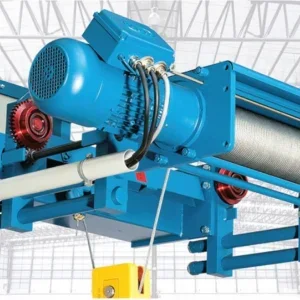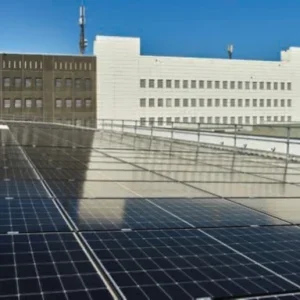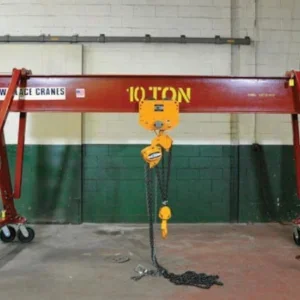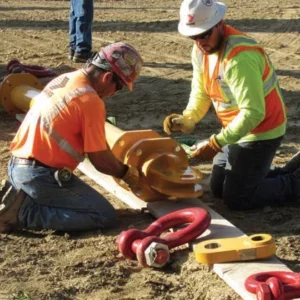The severity of the economic downturn and imposition of austerity has taken its toll, but for some sectors of industry at least there is movement in the recent past. For cranes and hoists, the important car and van making sector has been picking up with enough investment underway to produce some large orders.
Europe’s car industry in particular has been at least replacing equipment and even investing in additional plant for new model lines.
For Britain’s Jaguar Landrover now owned by Tata Motors part of the Indian steel and manufacturing Tata group, it has even been a boom period with dramatically expanding turnover. It is said Tata, which bought the business barely five years ago paid less than the UK company made in profits over the last 12 months
Recent news stories indicated that British car sales in general have picked up with export levels exceeding imports for the first time in 35 years.
Mostly these are also from foreign owned production including Japan’s Honda and Nissan selling into Europe, and Germany’s BMW which owns the Mini. But even so it is seeing considerable new investment and there may be further developments around new technology like electric cars from firms like Nissan.
New equipment is also going in to factories in Germany for Volkswagen, BMW and others and Renault has also installed some large items. "Russia is also a significant market" reports James Bow at Konescranes’ UK operation "and there seem to be a number of new plants being built there including in St Petersburg and even a whole new town for car production.
Russia was the world’s 15th largest car producer in 2010 with 7% of the worldwide production. It has its own firms but also eleven foreign carmakers have production operations or are constructing plants for a market that last year became the biggest in Europe, possibly sustained on oil and gas money.
Among the recent sales from Konecranes is a double order for large cranes at the Renault Douai and Sandouville plants in France. The cranes are for heavy work at the beginning of the lines when coils of steel plate are unloaded and moved to supply the presses.
Two strategic cranes had reached the end of their life and had been requiring a great deal of corrective maintenance reports Konecranes in France. "Moreover two roller tracks were old and have caused abnormal wear of the movement rollers."
But there was more to the job than simple replacement, because the carmaker wanted to take the change to redo its layouts. In particular at Sandouville there was a need to improve safety by preventing the cranes passing over certain area where personnel work at machines. The same factory want a positioning aid to help speed up press supply.
Douai has long been a Konecranes customer – three Process cranes went in there is recent times says the company and this helped it win an overall order for the two plants.
The Smarton product was selected as the best solution for both plants; each gets a Smarton 34T M8 crane.
For Douai this uses a fixed cabin layout for the main control but at the other factory the crane was fitted with a zone protection function using laser measurement to prevent collisions with a footbridge which crosses the factory floor to the offices.
Selection and installation of the cranes was done in conjunction with Renaults engineers who place a major emphasis on safety says Konecrances France.
Aside from the automatic blocking of any movement in the wrong direction, the new units include an anti-slack system to prevent load swinging and also have Dynatrack R which protects the roller faces to prevent them rubbing on the movement rail.
Meanwhile major supplier Terex Demag has carried out some significant projects. One of these is equipping a press shop in Volkswagen’s Bratislavian works.
The new equipment features a specially developed motorised tool gripper and this will allow an unusual compact three level storage system for the heavy tools used on the production line.
Two double-girder overhead travelling cranes are used in the press shop each with a span of 32 m and travelling on a 200mlong crane runway.
One is a process crane with 80t lifting capacity and this is equipped with the specially developed, motor-driven tool gripper. With the gripper, the body part production tools, each weighing up to 65t, can be stored in a space-saving manner on three levels.
The crane installation has a positioning control for independent control of up to 200 storage locations and discharge stations. Since the tools are now picked up by the gripper, manual attachment of the load is no longer required and safety for the crane staff is further increased.
The second of the two process cranes is used for transport and for maintenance of the pressing tools. It has two hoists with 70t and 32t lifting capacity installed on a single crab, which means the crane can also turn the tools during maintenance work without setting down the load.
Frequency-regulated drives provide for infinitely variable hoist speeds and synchronise parallel motion of the hoist units with counter motion required for turning — this increases safety during tool-turning. This second crane was delivered in advance in autumn last year to be used initially for the construction of the press line.
Both process cranes are equipped with by-pass control says Demag in order to prevent collisions of the attached tools with machines or hall buildings. The cranes also have a load sway damping system to improve load transport safety especially at higher crane and cross travel speeds.
The new installation will allow a greater depth of production at the plant which means material handling times can be reduced and costs lowered according to the production plant’s CEO Albrecht Reimold.
Construction of the press shop started in 2011 and first pressed parts should be manufactured in by the end of this year.
Cranes installations for press shops have also been made recently in BMW in Munich and, with the new gripper system, in Mercedes in Kuppenheim Germany.
Demag is also currently celebrating a half-centenary for its light crane system, the modular KBK construction kit first made in 1963.
Some 10000 km of profile has been installed since then it says and the groups’s Terex Materials Handling division continues the system today.
Automotive installations are a significant part of the work with latest versions which can handle overhead transport in graduated load ranges up to 3,200kg.
Demag says it has single and doublegirder suspension cranes, suspension monorails, slewing jibs and cranes, as well as portal and stacker cranes. All can be individually configured.
An increasingly interesting development in the automotive sector meanwhile is application of robotic and automated warehouse systems to production.
Finland’s Cimcorp for example is offering what it calls the Dream Factory for tyre manufacture and then for vehicle production lines an automated tyre-wheel assembly system.
Currently its tyre production system is being installed at Russia’s Yaroslavl Tyre Plant, owned by the Cordiant Group which makes car tyres, all steel truck tyres, and aircraft tyres. The automation system is for truck tyre handling, and comprises equipment and software for control of material flows from the tyre-building area to the testing.
Installation includes robots for unloading tyre-building machines, conveyors for green tyres from tyre-building to weighing and spraying, green tyre buffers, electric monorail systems for loading curing presses, and a conveyor from the press area to the finishing area in another building.
Other installations are being made in Korea and Hungary for Hankook.
The company’s TWA system automates the complex selection of components for customer’s varying requirements for wheel types as vehicles are made on the production line. Fitting tyres onto a rim is already automated, but collecting of vehicle-specific wheelsets is not.
Cimcorp offers a gantry robot product family to store and load wheels automatically and after the assembly line to hold tyre-wheel assemblies in a buffer for dispatch to the automobile plant.
An automotive product with a difference meanwhile is the tractor. The world most modern plant for their production is a title claimed by Germany’s Fendt plant in Bavaria following an extensive upgrade with new assembly halls and automated guided vehicle conveyancing for the units as they are built. A critical part of of the upgrade has been installation of Eepos lightweight aluminium rail material cranes for supplying many of the tractor parts to the work stations some as heavy as 500kg.
Eepos says the worker can move a 100kg load with just 0.5 to 0.8kg force and as little as 0.2kg to keep it moving which is one third the drag of conventional handling systems. The reduction results from a careful shaping of aluminium profiles for the crane rails and high precision trolleys using high-tech plastic rollers designed to prevent any tilting.
In America meanwhile there is also a pick-up in the industry.
Integrated Handling Solutions, Han-Tec, based in New York state, which specialises in tailoring crane and robot systems for moving components during production, says it has seen new demand including from the automotive sector.
The firm tailors solutions for production firms, it says. "They tell us their problem and we suggest the equipment for the task and how to integrate the various types of equipment needed" says design engineer Todd Vandesande.
The firm recently supplied a system to automate wheel production for trucks, moving aluminium wheel stampings through a machining and finishing sequence.
"They told us ‘we know how to make wheels but need to work out how to move the parts along’ " he says. His team designed a setup with robots and conveyors and a machine control system for the complex movements.
"We included a 3d recognition device that allows the robot to adjust to variations in the position of incoming wheel parts" he says. The company makes many of the tools fitted on the robots but also integrates outside suppliers’ parts, working for example with robot makers Fanuc of Japan and Germany’s Kuka, who supply the base robot units which carries specialist tools.
Another designer supply firm , proud of the tailored solutions it can offer, is Star Crane & Hoist. The company works mainly around Gorbel and Stahl equipment to devise applications for the customers.
Company president, Craig Derks says he has seen some positive industrial investment movement too, this time in the Michigan area which had been hard hit by the economic downturn.
Recent jobs include a difficult parts moving system installed in an existing factory to move components from machine to machine. The presence of the machine tools and cramped made the installation complex he says. The solution was a single runway system with Gorbel 2000 overhead cranes.
Finally Autoquip which makes American Lifts, has recently developed an innovative tipping parts bin for car production lines. The client had tight space constraints but wanted to use the kind of tilting parts bin that allows operators to reach the bottom layer of parts easily and ergonomically without wasting effort. The problem was that with limited space, the tilt intruded the bin onto the line. American Lifts devised a bin support that rolls back as it tilts to solve the problem.






